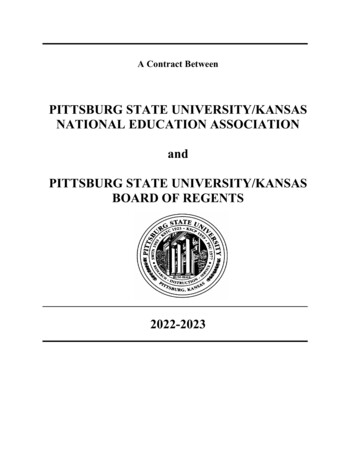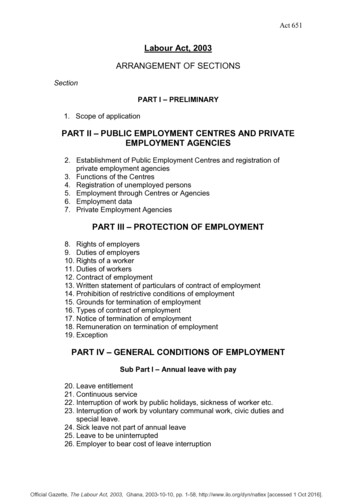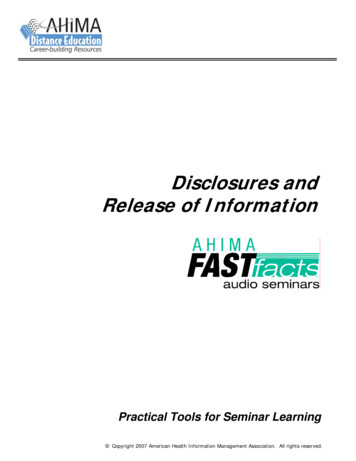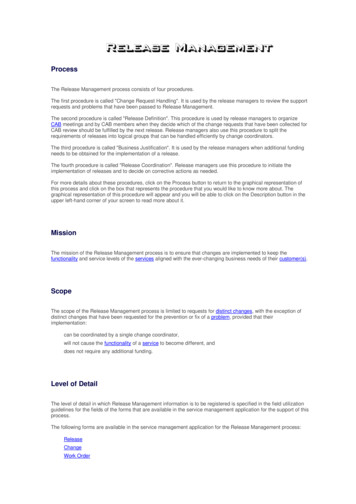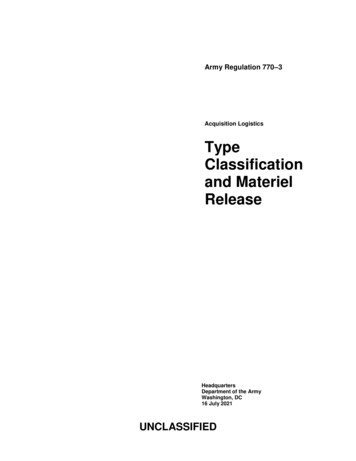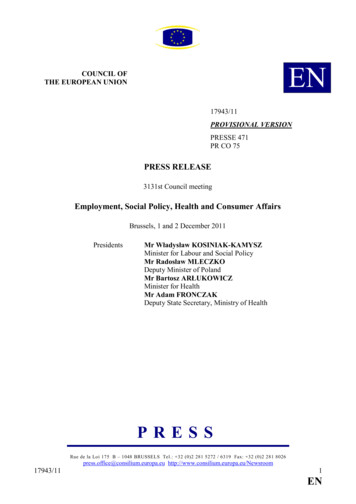
Transcription
ENCOU CIL OFTHE EUROPEA U IO 17943/11PROVISIO AL VERSIO PRESSE 471PR CO 75PRESS RELEASE3131st Council meetingEmployment, Social Policy, Health and Consumer AffairsBrussels, 1 and 2 December 2011PresidentsMr Władysław KOSI IAK-KAMYSZMinister for Labour and Social PolicyMr Radosław MLECZKODeputy Minister of PolandMr Bartosz ARŁUKOWICZMinister for HealthMr Adam FRO CZAKDeputy State Secretary, Ministry of HealthPRESSRue de la Loi 175 B – 1048 BRUSSELS Tel.: 32 (0)2 281 5272 / 6319 Fax: 32 (0)2 281 8026press.office@consilium.europa.eu http://www.consilium.europa.eu/Newsroom17943/111E
1.-2.XII.2011PROVISIO AL VERSIO Main results of the CouncilEmployment and Social PolicyThe Council reached a general approach on an amended regulation on the coordination of socialsecurity systems.Since a qualified majority could not be achieved, the Council did not reach a political agreement onthe prolongation of the crisis derogation concerning the European globalisation adjustment fund.It held a policy debate on the implementation of the Europe 2020 strategy in the employment andsocial policy field, and took stock of progress on amendments to directives on maternity leave,equal treatment and safety requirements for workers exposed to electromagnetic fields.The Council adopted conclusions on ageing and on the reconciliation of work and family life inthe context of the Beijing platform for action.Health and Consumer AffairsMinisters adopted three sets of conclusions on: Prevention, early diagnosis and treatment of chronic respiratory diseases in children; Early detection and treatment of communication disorders in children, including the use of eHealth tools and innovative solutions; Closing health gaps within the EU through concerted action to promote healthy lifestylebehaviours.Ministers also exchanged views on the Commission proposal for the Health for GrowthProgramme 2014-2020.17943/112E
1.-2.XII.2011PROVISIO AL VERSIO CO TE TS1PARTICIPA TS. 5ITEMS DEBATEDEMPLOYMENT AND SOCIAL POLICY . 7Coordination of social security systems. 7Exposure of workers to electromagnetic fields directive. 8European globalisation adjustment fund. 9Maternity leave directive . 10Equal treatment directive . 11Employment and social policy in the Europe 2020 strategy. 12Ageing : an opportunity for the labour market and the development of social services andcommunity activities . 14Reconciliation of work and family life in the context of the Beijing platform for action . 15Free movement of workers from Bulgaria and Romania. 16HEALTH AND CONSUMER AFFAIRS . 17Chronic respiratory diseases in children . 17Communication Disorders in children . 18Closing health gaps by promoting healthy lifestyle behaviours . 19Health for Growth Programme 2014-2020 . 20Any other business . 211 Where declarations, conclusions or resolutions have been formally adopted by the Council, this is indicatedin the heading for the item concerned and the text is placed between quotation marks. Documents for which references are given in the text are available on the Council's Internet site(http://www.consilium.europa.eu). Acts adopted with statements for the Council minutes which may be released to the public are indicated byan asterisk; these statements are available on the Council's Internet site or may be obtained from the PressOffice.17943/113E
PROVISIO AL VERSIO 1.-2.XII.2011OTHER ITEMS APPROVEDCULTURE–European Heritage Label panel . 24TOURISM–Projects co-financed by the European Regional Development Fund - Council conclusions. 24AGRICULTURE–Statistics on permanent crops . 25APPOI/TME/TS–Economic and Social Committee . 25–Committee of the Regions . 2517943/114E
1.-2.XII.2011PROVISIO AL VERSIO PARTICIPA TSBelgium:Ms Joëlle MILQUETMr Jean-Marc DELIZÉEBulgaria:Mr Stefan KONSTANTINOVMr Alexander EVTIMOVCzech Republic:Mr Jaromir DRÁBEKMr Vítězslav VAVROUŠEKDenmark:Ms Mette FREDERIKSENMs Karen Angelo HÆKKERUPMs Astrid Krag KRISTENSENMr Manu SAREENGermany:Ms Annette WIDMANN-MAUZDeputy Prime Minister and Minister for Employment andEqual Opportunities, with responsibility for Policy onMigration and AsylumState Secretary for Social AffairsMinister for HealthMinister plenipotentiary (Social Policy and Employment,European Economic and Social Committee (EESC),Permanent RepresentationMinister for Labour and Social AffairsDeputy Minister for HealthMinister for EmploymentMinister for Social Affairs and IntegrationMinister for Health and PreventionMinister for Gender Equality, Ecclesiastical Affairs andNordic CooperationMr Guido PERUZZOState Secretary, Federal Ministry of Education andResearchDeputy Permanent RepresentativeEstonia:Mr Hanno PEVKURMinister for Social AffairsIreland:Mr James REILLYMr Ciaran CANNONGreece:Mr Georgios KOUTROUMANISMr Andreas LOVERDOSSpain:Ms María Luz RODRÍGUEZ FERNÁNDEZMr Alfonso JIMÉNEZ PALACIOSMr Constantino SOTOCA CARRASCOSAMinister for Health and ChildrenMinister of State with special responsibility for Trainingand Skills (Department of Education and Skills)Minister for Employment and Social ProtectionMinister for Health and Social SolidarityState Secretary for EmploymentState Secretary for HealthMinister for Education and Employment of theAutonomous Community of MurciaFrance:Mr Xavier BERTRANDMr Philippe LEGLISE-COSTAMinister for Labour, Employment and HealthDeputy Permanent RepresentativeItaly:Mr Renato BALDUZZIMs Elsa FORNEROMinister for HealthMinister for Labour and WelfareCyprus:Ms Sotiroula CHARALAMBOUSMr Stavros MALASMinister for Labour and Social InsuranceMinister for HealthLatvia:Ms Ilze VIŅĶELEMr Rinalds MUCIŅŠMinister for WelfareState Secretary, Ministry of HealthLithuania:Mr Audrius BITINASMs Nora RIBOKIENEDeputy Minister for Social Security and LabourDeputy Minister for HealthLuxembourg:Ms Michèle EISENBARTHDeputy Permanent Representative17943/115E
1.-2.XII.2011PROVISIO AL VERSIO Hungary:Mr Miklós RÉTHELYIMr Sándor CZOMBAMalta:Mr Joe CASSARMr Chris SAID etherlands:Mr Henk KAMPMr Derk OLDENBURGAustria:Mr Rudolf HUNDSTORFERMr Harald GÜNTHERPoland:Mr Władysław KOSINIAK-KAMYSZMr Radoslaw MLECZKOMinister for National ResourcesState Secretary, Ministry of the National EconomyMinister for Health, the Elderly and Community CareParliamentary Secretary for Consumers, Fair Competition,Local Councils and Public DialogueMinister for Social Affairs and EmploymentDeputy Permanent RepresentativeFederal Minister for Labour, Social Affairs and ConsumerProtectionDeputy Permanent RepresentativeMr Bartosz ARŁUKOWICZMr Adam FRONCZAKMinister for Labour and Social PolicyDeputy State Secretary, Ministry of Labour and SocialPolicyMinister for HealthDeputy State Secretary, Ministry of HealthPortugal:Mr Pedro MOTA SOARESMr Pedro SILVA MARTINSMinister for Social SolidarityState Secretary for EmploymentRomania:Ms Sulfina BARBUMr Adrian STREINU-CERCELMinister for Labour, the Family and Social ProtectionState Secretary, Ministry of HealthSlovenia:Mr Uroš VAJGLDeputy Permanent RepresentativeSlovakia:Ms Lucia NICHOLSONOVAMr Peter JAVORCÍKState Secretary at the Ministry of Labour, Social Affairsand the FamilyDeputy Permanent RepresentativeFinland:Ms Paula RISIKKOMr Lauri IHALAINENMs Maria GUZENINA-RICHARDSONMinister for Social Affairs and HealthMinister for LabourMinister for Health and Social ServicesSweden:Ms Hellevi ENGSTRÖMMr Göran HÄGGLUNDMr Jan OLSSONMinister for EmploymentMinister for Health and Social AffairsDeputy Permanent RepresentativeUnited Kingdom:Mr Chris GRAYLINGMr Andy LEBRECHTMinister for EmploymentDeputy Permanent RepresentativeCommission:Ms Viviane REDINGMr László ANDORVice-PresidentMember17943/116E
PROVISIO AL VERSIO 1.-2.XII.2011EMPLOYME T A D SOCIAL POLICYCoordination of social security systemsThe Council reached a general approach by qualified majority on amendments to the coordinationof social security systems regulations 883/2004 and 987/2009 (17421/11 ADD1), thus paving theway to seek an agreement in first reading with the European Parliament.The amendments aim at providing a satisfactory solution in the case of wholly unemployedformerly self-employed frontier workers who were insured in their country of activity againstunemployment and who returned to their member state of residence, where no insurance against therisk of unemployment exists (new article 65a in regulation 883/2004).Article 65a introduces a derogation, according to which the country of last activity would provideunemployment benefits to the wholly unemployed self-employed person who resided outside thecompetent member state, if there is no possibility for any category of self-employed persons to becovered by the unemployment benefits system in the country of residence.Adopted amendments consist also in the use of the "home base" criterion for determining thelegislation applicable to aircrew members (new paragraph in article 14 of regulation 987/2009).The aim of the amendment is to clarify the notion of "registered office or place of business" as"home base" for flying personnel. The home base is the place from which the air crew memberhabitually carries out his or her work in performance of his or her contract.17943/117E
PROVISIO AL VERSIO 1.-2.XII.2011Exposure of workers to electromagnetic fields directiveThe Council took note of a progress report on a directive on the minimum health and safetyrequirements regarding the exposure of workers to the risks arising from physical agents(electromagnetic fields) (17019/11).The aim of the proposal is to revise directive 2004/40/EC in order to take into account newscientific studies, while ensuring high levels of worker protection and, inter alia, to review theimpact of exposure limit values for magnetic resonance imaging (MRI) scanner.Directive 2004/40/EC was adopted together with other measures intended to protect workers fromthe health effects of noise, vibration and optical radiation. However, soon after its adoption in 2004,the medical community working with magnetic resonance imaging (MRI) claimed that its activitieswould be hampered by the strict exposure limit values laid down therein.Due to these difficulties in its application and to allow time for the directive to be amended in thelight of new scientific information, Parliament and Council decided at that time to delay itstransposition until 30 April 2012.Despite significant progress made in the Council's bodies and given that the dossier is very complexand technical, there is still a need for further consultations with experts on two main sets of issues:the way of expressing exposure limitations and derogation(s) to binding exposure limits.17943/118E
PROVISIO AL VERSIO 1.-2.XII.2011European globalisation adjustment fundThe Council did not reach a political agreement on the prolongation of the crisis derogationconcerning the European globalisation adjustment fund (EGF), since qualified majority could not beachieved.However, the presidency has been able to report on the progress made until now, based on thereport contained in document 16706/4/11 REV 4.The proposed regulation aims at extending the crisis-related derogation (introduced in 2009 and dueto expire on 31 December 2011) for another 2 years until 31 December 2013, i.e. the end of thecurrent multiannual financial framework. The extension of the derogation is thus without prejudiceto the negotiations on the future of the EGF.The EGF was established in 2006 by regulation 1927/2006 with the main objective of providingsupport to workers affected by redundancies resulting from changes in world trade patterns. By cofunding active labour market policy measures, the EGF aimed at facilitating the re-integration intothe labour market of workers in sectors or regions suffering the shock of serious economicdisruption.In the light of the scale and speed of developments in the financial and economic crisis in 2008, theCommission proposed a first revision of the regulation. The aim of the 2009 revision was inter aliato introduce a temporary derogation as part of Europe's crisis response, turning the EGF into anearly, more effective crisis intervention instrument in line with the fundamental principles ofsolidarity and social justice.This derogation enlarged the scope of the EGF to cover support in favour of workers maderedundant as a direct consequence of the financial and economic crisis and to increase the level ofEGF co-funding from 50 to 65 %.Since the introduction of the crisis derogation, there has been a sharp increase in the number ofapplications for EGF support and an increase in the number of member states applying for EGFsupport: between May 2010 and July 2011, 62 applications for 52 875 workers were introduced fora total amount of EUR 275 857 280.17943/119E
PROVISIO AL VERSIO 1.-2.XII.2011Maternity leave directiveThe Council took stock of progress made on the maternity leave directive on the basis of aPresidency report (17029/11).The report draws the following preliminary conclusions:–maternity leave (even shorter than 20 weeks) with fully paid maternity leave was notsupported;–considering further payment at the level of sick pay was the option that won the mostsupport from delegations. Several delegations raised the concern that "sick pay" itself wasan unclear term (there are different levels of sick pay, including statutory and contributorysick pay, and the level might also depend on the length of the sickness);–there was also some support for an option entailing a maternity allowance with a ceiling, asa basis for further discussion;–while some delegations considered the "passerelle" clause to be an interesting option, therewere others who were not able to accept this approach.Moreover, it concludes that, in the light of recent discussions and the informal ministerial meetingin Cracow on 21 October, it has become crystal clear that the period of 20 weeks of maternity leavewith full pay is unacceptable to the Council. Taking into account the broad diversity of maternityprotection and social security systems among the different member states, as well as the financialimplications especially during the crisis, the introduction of such a solution could havecounterproductive effects.17943/1110E
PROVISIO AL VERSIO 1.-2.XII.2011Equal treatment directiveThe Council took stock of progress regarding the directive implementing the principle of equaltreatment between persons irrespective of religion or belief, disability, age or sexual orientation(16525/11).This proposal has been examined in the Council for more than three years now. It would extend EUlegislation into new areas, based on article 19 of the EU treaty.During the Polish presidency, the Council's bodies discussions have focused on a specific topic,namely, the provisions concerning age as a discrimination factor. In certain cases, differentialtreatment is justified. For example, age limits are needed to protect minors.Further discussion is needed on a number of outstanding issues, such as:–the division of competences, the overall scope and subsidiarity;–the disability provisions, including accessibility and reasonable accommodation forpersons with disabilities;–the implementation calendar;–legal certainty in the directive as a whole.17943/1111E
PROVISIO AL VERSIO 1.-2.XII.2011Employment and social policy in the Europe 2020 strategyThe Council held a policy debate on the employment and social policy issues linked to the Europe2020 strategy, on the basis of a Presidency background note (17426/11).The Council took note of Commission's presentation of the annual growth survey for 2012 as wellas the draft joint employment report annexed to the survey (17229/11 ADD 3).Ministers analysed the first year's experience and expressed expectations for the second year of theimplementation of the strategy in the employment and social policy field.They stressed that fiscal consolidation and reform programmes should be well-balanced withrespect to their social impact and to the European social model. Growth must go hand in hand withjob creation. Efforts should concentrate to the young and the long-term unemployed people, byoffering them training and action programmes in order to improve their skills and reintegrate thelabour market. They also underlined that reintegrating the labour market is essential to escape frompoverty and social exclusion.The Commission pointed out that the EU should give a convincing response to the crisis since notonly financial affairs but also social cohesion and the European social model are at stake. Fiscalconsolidation is needed but it should be accompanied by job creation and restored confidence. Thepersistently high rate of unemployment in the EU and a growing number of people at risk ofpoverty require determined action. Those hit mostly by unemployment and economic inactivity risklosing their skills and leaving the labour market. Over the past three years, youth unemployment hasrisen from 15% to 21%. It is Europe's duty to ensure that an entire generation won't be lost becauseof the crisis.The Council adopted conclusions (17423/11) on the follow-up of the first European Semesterwhich both evaluate the work already undertaken and outline how the implementation shouldcontinue in 2012. The conclusions are largely based on the thematic report prepared by theEmployment Committee (EMCO) and on a Social Policy Committee (SPC) opinion.17943/1112E
PROVISIO AL VERSIO 1.-2.XII.2011The thematic report covers a number of issues (17239/11). First, the role of labour costs and wagepolicies are examined. The report considers the role of labour costs with regard to productivity, toinflation or deflation, to international competitiveness, and with regard to economic growth ingeneral. The report also looks into the issues of labour market participation and job creation.Particular attention is paid to the labour market participation of female workers and of olderworkers. It is important that there is sufficient stimulus for the participation of these workers. Theincentives could for example be appropriate taxation and benefits and adequate provisions of carefacilities, especially for children.The Council also endorsed the above SPC opinion in anticipation of the full report of the latter onthe social dimension of Europe 2020 planned for the beginning of 2012 (17050/11). The opinionfocuses on the social impact of the crisis, stressing that the social consequences have revealedmarked impacts, for example the growth of recipients of minimum income, social assistance andhousing benefits. Social security schemes are under increasing pressure due to the prolongedeconomic crisis. It is therefore essential that social protection systems continue offering protectionand improving people's employability.The Presidency summarised the main aspects of the debate as follows:–there is a need for urgent action; despite the crisis, it is important to increase efforts to raiseemployment, and work on social cohesion;–there is a need for structural reforms, for instance in the benefit and pension systems;–it is important to match the education and training with the skills needed in the labourmarkets;–the EPSCO Council has a role to play in the process of economic governance;–and, above all, optimism has to prevail in the EU.The Presidency will submit the conclusions and the related documents as the EPSCO contributionto the European Council of 9 December. In the European Council, member states participating inthe Euro plus Pact will track progress on the implementation at national level, in particular in thearea of employment.17943/1113E
PROVISIO AL VERSIO 1.-2.XII.2011Ageing : an opportunity for the labour market and the development of social services andcommunity activitiesThe Council adopted conclusions on ageing as an opportunity for the labour market and for thedevelopment of social services and community activities (16474/11 ADD 1).The conclusions, in the context of the unprecedented demographic changes the EU is currentlyfacing, call for greater involvement of and an active role for older people.Older people represent a great potential for Europe's future competitiveness and prosperity ineconomic and social life. This should be achieved by inter alia removing employment obstacles,improving employment conditions, addressing premature exits from the labour market, fightingagainst discrimination and investing in lifelong learning.The conclusions are also very timely in view of the forthcoming European year of active ageing andsolidarity between generations (2012).17943/1114E
PROVISIO AL VERSIO 1.-2.XII.2011Reconciliation of work and family life in the context of the Beijing platform for actionThe Council adopted conclusions on the reconciliation of work and family life in the context of theBeijing platform for action (17420/11).Helping women and men to reconcile their duties at work with their duties as parents and carers isimportant. Finding the right balance is not only good for families: it is good for the economy,because it allows more people to fulfil their potential in the labour market.The conclusions call for efforts to support the reconciliation of work, family and private life,including by means of different kinds of care provision, family-related leave and flexible workingarrangements. They also highlight the need to ensure that reconciliation policies do not harmwomen's career prospects and economic situation. These questions are also relevant in the contextof the Europe 2020 Strategy, where an employment target of 75% has been agreed.The conclusions follow on from a report of the European institute for gender equality (16835/11ADD 1), drafted in the context of the follow-up to the Beijing platform for action.The Beijing platform for action is the United Nations agenda for women's empowerment.Much of the Council's work in the area of gender equality takes place within the framework of theBeijing platform.17943/1115E
PROVISIO AL VERSIO 1.-2.XII.2011Free movement of workers from Bulgaria and RomaniaThe Council took note of Commission's report on the functioning of the transitional arrangementson the free movement of workers from Bulgaria and Romania (16923/11 ADD 1).Over lunch, ministers discussed "youth employment" on the basis of a Presidency background note(17590/11).17943/1116E
PROVISIO AL VERSIO 1.-2.XII.2011HEALTH A D CO SUMER AFFAIRSChronic respiratory diseases in childrenThe Council adopted conclusions entitled "Prevention, early diagnosis and treatment of chronicrespiratory diseases in children" (16709/11), calling upon member states to give appropriateconsideration to the prevention, early diagnosis and treatment of chronic respiratory diseases inchildren in their health programmes. Member states should also increase public awareness of thesediseases, strengthen smoking prevention and cessation programmes for pregnant women and followthe Council recommendation on smoke-free environment (15937/09). The Commission is invited tosupport member states in developing and implementing effective policies on the prevention ofchronic respiratory diseases in children, improving networking among institutions responsible forthe implementation of member states' programmes, and strengthening cooperation of nationalcentres and reinforcing existing international research networks.Chronic respiratory diseases in children are one of the priorities of the Polish Presidency in the fieldof public health.Allergic rhinitis and asthma are the most common respiratory diseases in children and asthma is themost common reason for emergency room visits and hospital admissions among children.The conclusions take into account the outcomes of the experts' conference on "Prevention andcontrol of childhood asthma and allergy in the EU from the public health point of view: urgent needto fill the gaps", held on 21-22 September 2022 in Warsaw, which highlighted an urgent need toimprove the prevention, early detection and treatment of chronic respiratory diseases in children byaddressing them in health policy at local, regional, national and EU levels. The issue of chronicrespiratory diseases in children was also brought to the attention of the ministerial level conference"Solidarity in health. Closing the health gaps within the EU", held in Poznań on 7-8 November2011.17943/1117E
PROVISIO AL VERSIO 1.-2.XII.2011Communication Disorders in childrenThe Council adopted conclusions entitled "Early detection and treatment of communicationdisorders in children, including the use of e-Health tools and innovative solutions" (16620/11),inviting member states to continue to give priority to early detection by screening and follow-up forhearing, vision and speech disorders in children. Together with the Commission member statesshould consider the field of communication disorders in children as part of the ongoing process ofwork to be carried out on European reference networks in line with the cross-border healthdirective, and also give appropriate consideration to this topic in the context of the EU's current eHealth initiatives, including the e-Health network. The Commission is called upon to adopt thecriteria and conditions for European reference networks by the end of 2013, taking into account theexperience of cooperation among specialized centres for the treatment of communication disorders.According to the World Health Organisation (WHO), half of all cases of deafness and hearingimpairment are avoidable through prevention, early diagnosis and management.The conclusions take into account the conclusions of the 10th Congress of the European Federationof Audiology Societies (EFAS), held on 22-25 June 2011 in Warsaw, highlighting the problem ofcommunication disorders in children and the role of early detection and intervention.On a Polish initiative, representatives of European scientific societies for audiology, ophthalmologyand speech therapy signed the "European consensus on hearing, sight and speech screenings forchildren beginning the school education" on 22 June 2011.17943/1118E
PROVISIO AL VERSIO 1.-2.XII.2011Closing health gaps by promoting healthy lifestyle behavioursThe Council adopted conclusions on "Closing health gaps within the EU through concerted actionto promote healthy lifestyle behaviours" (16708/11), inviting member states to continue, intensifyor develop policies and actions promoting healthy lifestyle behaviours and addressing socialdeterminants in order to contribute to closing health gaps. The member states and the Commissionare also called upon to maintain and strengthen, as appropriate, those actions and policies shown tobe effective in reducing health gaps, to promote the effective implementation of a 'Health in allPolicies' approach with a focus on equity, and to strengthen cooperation and make better use ofexisting networks. They also call for the promotion of healthy lifestyle behaviours through tobaccocontrol, reduction of fat, salt, sugar and energy in food, implementation of the World HealthOrganisation (WHO) set of recommendations for the marketing of food and non-alcoholicbeverages as well as implementing effective alcohol policies and improving urban environments.According to the Commission, there are large differences in health between member states. As anexample, the probability of a child dying before its first birthday differs by a factor of five. Lifeexpectancy at birth varies by eight years (for females) and 14 years (for males). In all memberstates, the level of disease and the age that people die at are strongly influenced by factors such asemployment, income, length of education and ethnicity. In today's Europe, six of the seven biggestrisk factors for premature death (blood pressure, cholesterol, Body Mass Index, inadequate fruit andvegetable intake, physical inactivity and alcohol abuse) relate to how we eat, drink and move.The conclusions take into account the outcomes of the expert meeting on "Al
Employment, Social Policy, Health and Consumer Affairs Brussels, 1 and 2 December 2011 Presidents Mr Władysław KOSII AK-KAMYSZ . Social Affairs and Consumer Protection Mr Harald GÜNTHER Deputy Permanent Representative . The aim of the amendment is to clarify the notion of "registered office or place of business" as



